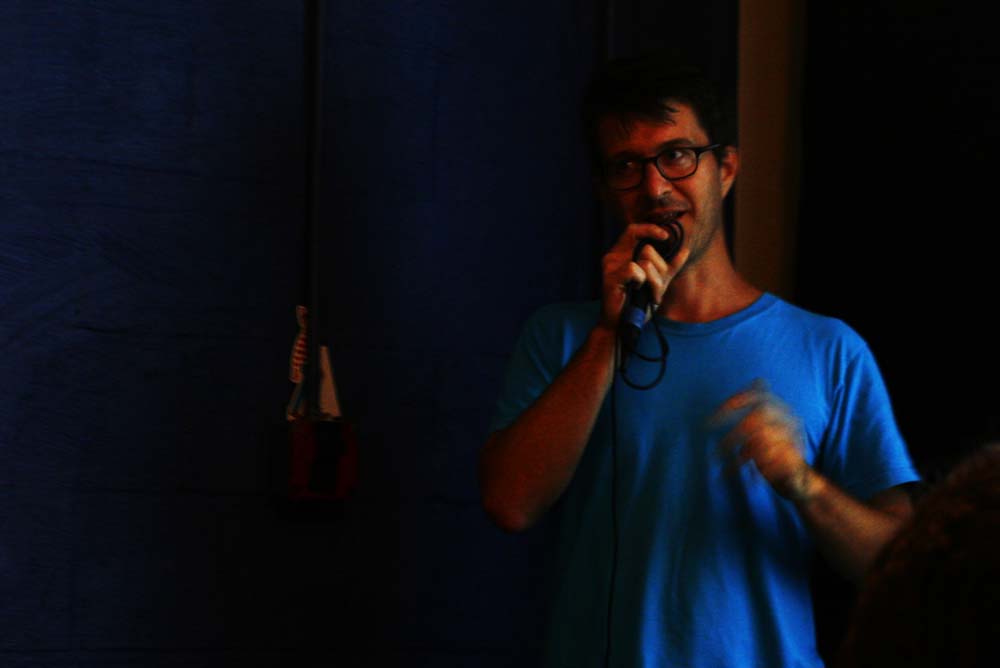Every dating site, Christian Rudder explained, has to have some sort of method of crowdsourcing the attractiveness of its members, or else it turns into “a shitshow.”
You might be wondering, as this reporter did, what he could possibly mean by that (more on that in a minute). It was just one of several gems shared by the OkCupid cofounder during an event last week at WORD Bookstore, in Greenpoint.
The occasion? The release of Rudder’s new book, Dataclysm: Who We Are (When We Think No One’s Looking).
The book is about the sea of data we are creating out there, written by someone with unfettered access to at least one pretty interesting chunk of that sea: the dating and relationship data generated by OkCupid.
There's some balance between lust and pride, which are the two fundamental sins of online dating.
With this sort of data, Rudder points out, researchers no longer really need to construct experiments to explore many questions. In many cases, you can simply look at the data generated organically by these social websites.
We have not read the book. However, here are a few takeaways from what was a pretty amusing conversation:
- OkCupid launched in 2004. No one was fixated on “big data” back then. For the founders, it was more about math.
- “OkCupid’s origins were so long ago that we almost come at it from the chat room world: age/sex/location,” Rudder said.
- There’s a lot of talk about sites knowing everything about you, but Rudder pointed out that there’s a huge gap in knowledge for all dating sites, “You just don’t know what people do when they leave the keyboard,” he said. However, he also pointed out that Facebook claims to be able to tell whether your parents divorced when you were young based on your liking activity, which could mean that dating sites will be able to find ways to make much more educated guesses about what you do beyond the keyboard, soon.
- After presenting a slightly different version of these charts, which show that women tend to find men about their age the most attractive and all men of all ages prefer very young women, Rudder said that doesn’t necessarily reflect who men pursue on the site, saying, “There’s some balance between lust and pride, which are the two fundamental sins of online dating.”
- On the other hand, women, as a group, tend to find most of the men on OkCupid pretty unattractive. The curve of their interest veers heavily to the “not so much” side. Whereas men, on the other hand, are a bit more generous. Their assessments, in total, come out looking much more like a natural bell curve, with the overwhelming majority of women following in the not-bad to pretty-good range, and a small number in the extremes of “Holy Cow” and “Ooph.”
In one of those moments that reminds you that this is still a young industry, one developer in the crowd raised his hand and identified himself as a former employee of Plenty of Fish (one of very few big dating sites not owned by InterActive Corp), a Canadian company. He read a message sent to him via text from one of his friends still at his former employer, who wanted to know how OkCupid defines success for a match.
The whole room laughed as Rudder said that maybe he shouldn’t answer the question. Just imagine for a moment if someone from Honeywell tried to pull something like that at a book release for a GE executive? It wouldn’t happen.
Rudder answer the question. The answer is four messages. Two from each interlocutor. That’s success.
Have you read Dataclysm? Let us know what you thought. We’re interested.
In the meantime: the “shitshow.”
This reporter asked the last question of the night, which was to define what Rudder meant by the trouble that results if sites don’t control for attractiveness. Rudder said that the more refined way to describe it is “the focus problem.” If you just let it go, the small handful of super hot women on the site get flooded by messages, it frustrates them, they leave and it just happens all over again to the next hottest group of women. So sites have to control a bit how many people see the outliers, for their sake and so they don’t blow everyone else completely out of the water.
Rudder is 39 and lives in Brooklyn. If you want an idea of what his next book will be about, keep an eye on the company’s blog, where he has always taken the lead.
Join the conversation!
Find news, events, jobs and people who share your interests on Technical.ly's open community Slack

